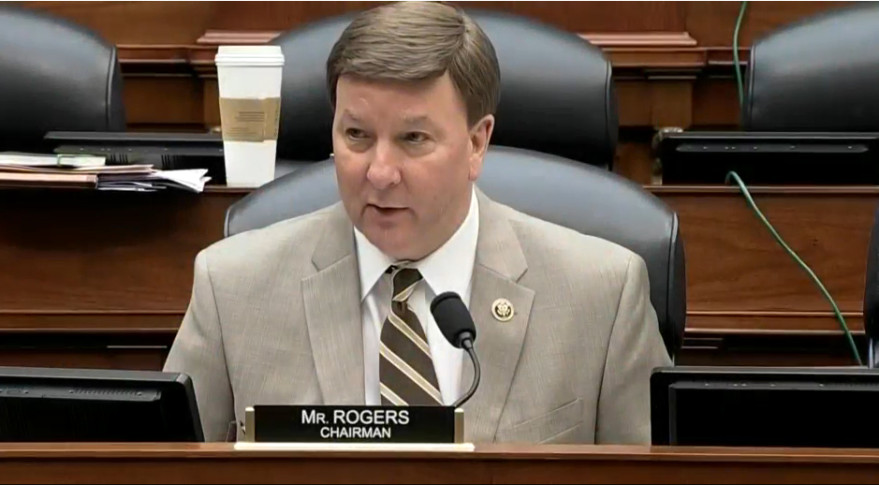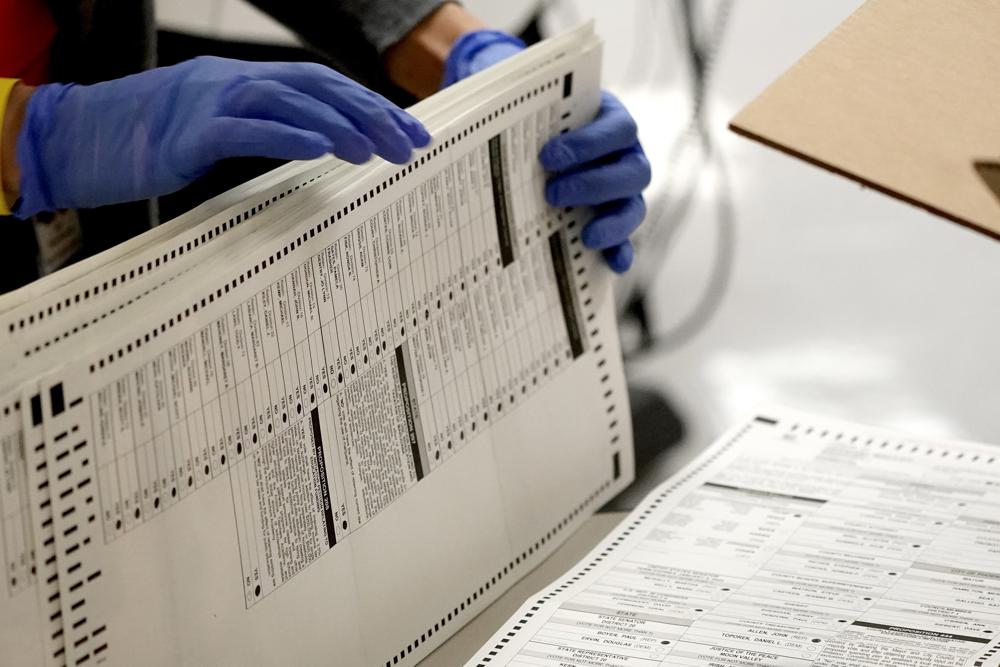Mike Johnson elected speaker of the House after three weeks of infighting

By Casey Harper | The Center Square The U.S. House of Representatives voted Wednesday to elect Rep. Mike Johnson, R-La., as speaker of the House, ending more than three weeks without a speaker and a string of chaotic meetings and votes on Capitol Hill. Johnson received multiple standing ovations from his colleagues Wednesday before securing the speakership. The final vote was 220-209, with Democrats supporting Minority Leader Hakeem Jeffries. “Today is the day that House Republicans will humbly look in our hearts and elect Mike Johnson as speaker of the people’s House,” Conference Chair Rep. Elise Stefanik, R-N.Y., said in a speech from the House floor ahead of the vote, calling Johnson “a man of deep faith,” and “a deeply respected Constitutional lawyer.” “Mike is strong, tough, and fair, and above all, Mike is kind,” Stefanik added. Stefanik announced on Sunday nine candidates that were making a bid to be speaker, but that number was slowly whittled down as lawmakers dropped out. “Today is the day we get this done,” Stefanik said in her Wednesday speech. U.S. Rep. Pete Aguilar, D-Calif., gave a speech from the floor to nominate Jeffries for speaker and attack Republicans. Jeffries blasted Republicans for “all of the infighting, all of the disarray just to end up where we were three weeks ago.” Johnson pitched Republicans on an aggressive legislative agenda over the next few weeks. Under his leadership, the House will face a looming partial government shutdown deadline in the middle of November as well as ongoing calls to fund Ukraine and Israel in their respective wars. “We must govern well and expand our majority next year,” Johnson said in a letter to his fellow Republicans over the weekend, asking for support in the speakership race. President Joe Biden called on Congress last week for more than $100 billion to that end, as well as funding for Taiwan, the immigration issue, and other priorities. That proposal was met with immediate pushback from Republicans in the House and Senate. Some funding for Israel, though, is likely to pass. More funding for Ukraine has become a divisive issue for Republicans, and it remains unclear how many more billions lawmakers will be willing to send to Ukraine. Notably, U.S. Rep. Kevin Hern, chairman of the Republican Study Committee, was running for speaker but later dropped out and told reporters he was supporting Johnson. The chaotic three-week battle for a speaker began when U.S. Rep. Matt Gaetz, R-Fla., filed a motion to vacate former House Speaker Kevin McCarthy, R-Calif. At that point, Majority Leader Steve Scalise won the nomination but quickly backed out after being unable to secure the needed votes. After that, House Judiciary Chair Rep. Jim Jordan, R-Ohio, won the nomination but lost it days later after three failed votes on the House floor, with 25 Republicans ultimately voting against him. Majority Whip Tom Emmer, R-Minn., was next to secure the nomination but almost immediately withdrew after failing to gain support. Notably, former President Donald Trump campaigned against Emmer. Before the vote Wednesday, Johnson posted on X, formerly known as Twitter, a picture of the American flag in the House Chamber, which has inscribed above it, “In God We Trust.” Republished with the permission of The Center Square.
Mike Johnson is GOP’s fourth choice to be Speaker of the House

House Republicans have nominated Congressman Mike Johnson (R-Louisiana) for Speaker of the House on Tuesday night after Tuesday morning’s nominee crashed and burned. Congressman Barry Moore (R-AL02) told Alabama Today on Saturday that he really liked Johnson. Congressman Dale Strong (R-AL05) announced his support for Johnson on the social media site X. “Since day 1 I have called for our party to unite around a conservative speaker,” Strong said. “I am proud to announce that the conference has selected Mike Johnson from Louisiana and I look forward to supporting him on the floor.” On Tuesday morning, the GOP started with nine candidates, including Alabama’s own Congressman Gary Palmer (R-AL06). Palmer dropped out of the race, pledging to support whoever became the Speaker of the House. The House Republican Conference then chose House Majority Whip Tom Emmer (R-Minnesota) after five rounds of voting. The ousted Speaker of the House, Kevin McCarthy (R-California), endorsed Emmer. Former President Donald Trump was not an Emmer fan and denounced Emmer as a “Globalist RINO” on Truth Social. More than two dozen Republican House members were refusing to support Emmer. Trump’s rebuke made it apparent that the moderate from a blue state had no chance, so he dropped out. Rep. Marjorie Taylor Greene (R-Ga.) explained in a post on X, formerly Twitter, why she didn’t back Emmer: his voting record. “Today I voted against Tom Emmer on all rounds of voting including the spoken roll call vote because he has a voting record I can’t support,” Green said. “He voted for Democrat gay marriage bill, voted with Democrats to overturn President Trump’s transgender military ban, voted for every penny of Ukraine funding, at one time supported the Soros national popular vote scheme, and voted to certify Biden’s 2020 election. We need a Republican Speaker that reflects the values of Republican voters that can lead our conference.” Johnson was chosen by Republicans in a conference vote on Tuesday night. He follows Emmer, Jim Jordan, and Steve Scalise as the party’s nominee. Johnson represents Louisiana’s Fourth District. He represents the nearly 760,000 residents of 16 parishes in the northwest and western regions of the state. He was first elected in 2016. In January 2021, Johnson was elected Vice Chairman of the House Republican Conference. Johnson also serves as a Deputy Whip for the 118th Congress. Johnson is an attorney with two decades of previous experience in Constitutional law. He serves on the House Judiciary Committee and is the chairman of its Subcommittee on the Constitution and Limited Government. He also serves on the Select Committee on the Weaponization of the Federal Government and the House Armed Services Committee. Johnson is a husband and father of four. In his legal career, he was a leading defender of the right to life, religious liberty, free speech, the Second Amendment, and free market principles. He served in the Louisiana Legislature from February 2015 to January 2017, where he was appointed Vice Chairman of the House Judiciary Committee and the Select Committee on Leadership. He is the eldest son of a Shreveport firefighter who was critically burned and disabled in the line of duty. Johnson has also been a college professor, conservative talk radio host and columnist, a media spokesman for America’s largest religious liberty organizations, a constitutional law seminar instructor, and a board member for national organizations and numerous community groups and ministries. Johnson has a law degree from the Paul M. Hebert Law Center at Louisiana State University. He earned his undergraduate degree from LSU. A vote could occur as soon as Wednesday morning. Johnson needs 217 votes to win. The biggest thing Johnson has going for him is the whole absurdity of this situation. Republican House members realize that this situation does not make them look good, and they have to move on to regular business, including budgets and the President’s request for military aid for Ukraine and Israel. Congressman Robert Aderholt (R-AL04) said on X, “We have got to find consensus on a Speaker. Time is of the essence. Democrats are the only ones who benefit from this impasse.” To connect with the author of this story or to comment, email brandonmreporter@gmail.com.
Tom Emmer drops bid to be Speaker: House Republicans back to square one

On Tuesday, the House Republican Conference met to decide who would be their next nominee to be the Speaker of the House. They chose House Majority Whip Tom Emmer (R-Minnesota). Emmer had the endorsement of ousted Speaker of the House Kevin McCarthy (R-California). It was the safe choice. Emmer had waited his turn behind McCarthy and House Majority Leader Steve Scalise (R-Louisiana), and he was respected on Capitol Hill. It was also a doomed choice. Emmer won a narrow victory and excited no one in the conservative base that appears to want unprecedented influence on how the GOP actually governs and who it elects to the Speakership. Former President Donald Trump (R) criticized the selection, as did a number of conservative influences. Within a few hours of being elected as the nominee, Emmer admitted his cause was hopeless and withdrew from the race. Emmer was criticized by conservatives for voting for the Respect for Marriage Act, voting to certify the 2020 election results, and for being the number three person on the leadership team that some conservatives felt had not represented them. Alabama Congressman Gary Palmer (R-AL06) withdrew from the Speaker’s race the morning before the Conference even voted. “If withdrawing my name can help expedite that process even a little, then I will gladly step aside,” Palmer said in a statement. “The candidate forum and individual conversations have given me great hope for the future of the 118th Congress.” In the vote of the Conference, Emmer narrowly beat Rep. Kevin Hern (R-Oklahoma) for the nomination. Hearn is back in the running for the spot to be the fourth nominee, as well as Rep. Mike Johnson (R-Louisiana). Scalise had been the Conference’s first choice, but he could not get the support of the ultra-right Freedom Caucus members, so he withdrew without a floor vote. House Judiciary Committee Chairman Jim Jordan (R-Ohio) was the next nominee. Jordan had the support of Trump, but it was not enough. Despite bringing his case to the floor three separate times, Jordan could not win over GOP moderates who were angry at conservatives for having failed to support Scalise. Conservatives have now rejected Emmer as being too much of a moderate. The Republicans control the chamber by a 221 to 212 margin. Democrats continue to vote for their candidate, House Minority Leader Hakeem Jeffries (D-New York). The House Republican Conference is expected to meet on Wednesday to seek a new nominee. Election as Speaker requires a minimum of 217, so only a small faction of 5 or more Republicans is sufficient to sabotage any Republican nominee for the post. Long gone are the days when Republican Congressmen would carry out the will of the majority of their Conference and show no public divisions. This Caucus appears to be bitterly divided and is unashamed to make those divisions all too public. To connect with the author of this story or to comment, email brandonmreporter@gmail.com.
Republicans announce nine new speaker candidates

By Casey Harper | The Center Square Nine new Republican lawmakers have thrown their hat in the ring to become the next speaker of the U.S. House. Republican Conference Chair Rep. Elise Stefanik released the list of candidates, who had until noon Sunday to announce their candidacy. The list, which Stefanik posted on X, formerly known as Twitter, is as follows: The new list of candidates comes after former House Speaker Kevin McCarthy, R-Calif., was ousted from the role when Rep. Matt Gaetz, R-Fla., filed a motion to vacate. Then, Majority Leader Steve Scalise, R-La., was the party’s choice to become speaker, but he withdrew when he was unable to get the support he needed. House Judiciary Chair Rep. Jim Jordan, R-Ohio, was next in line and worked for several days to get the needed 217 votes to become speaker. However, at least 20 Republicans voted against him across his three floor-vote attempts, and on Friday, his nomination was revoked. Some of the candidates have more support than others. Donalds’ announcement drew more attention than some others. Emmer has been a rumored pick for speaker as well. However, conservative Republicans have expressed frustration with moderate Republicans for rejecting Jordan, who had significant support with the Republican base but was seen as a hardline conservative who questioned the results of the 2020 presidential election. “The most popular Republican in Congress was just knifed in an anonymous vote in a secret closed-door meeting in the basement of the Capitol,” Gaetz wrote on X Friday. “This is the Swamp at work.” Meanwhile, some more moderate Republicans have expressed frustration with Gaetz and do not want to reward his ousting of McCarthy with an aggressive conservative pick. As The Center Square previously reported, Jordan sparked pushback from his own party on Thursday after reports surfaced that he said behind closed doors he would back the speaker pro Tempore, U.S. Rep. Patrick McHenry, R-N.C., for a limited temporary speakership role so the government could be funded and other key legislative goals hit. The federal government faces a partial shutdown in November, and there is increasing pressure to send more funds for the Ukraine and Israel wars. President Joe Biden called on Congress to pass a spending package of $105 billion for those wars as well as some border funding and money for Taiwan, which national security experts say China could invade at any time. Jordan later addressed reporters, announcing he would drop that plan and instead hold another vote. That plan still has potential to take effect. While many Republicans have expressed opposition to the idea, Democrat Minority Leader Hakeem Jeffries has seemed open to the idea when talking with reporters. Republished with the permission of The Center Square.
Robert Aderholt votes in favor of Born-Alive Abortion Survivors Protection Act

The U.S. House of Representatives on Wednesday passed legislation requiring that abortion doctors provide emergency care to infants that are born alive during an abortion. Congressman Robert Aderholt voted in favor of the bill and applauded its passage. “I was proud to speak on the House floor today in support of H.R. 26, which would require that babies born during an abortion be given the same medical care and treatment that any other baby born at that stage of development would be given,” Aderholt said in a statement on Facebook. “This bill has passed in the House before and previously received bipartisan support.” The National Right to Life Committee (NRLC), the nationwide federation of right-to-life organizations, supports the legislation – the Born-Alive Abortion Survivors Protection Act. “National Right to Life believes that it is time for Congress to act decisively to put the entire abortion industry on notice that when they treat a born-alive human person as medical waste or as a non-entity who may be subjected to lethal violence with impunity, they will do so at legal peril,” the group said in a statement. “H.R. 26 would enact an explicit requirement that a baby born alive during an abortion must be afforded “the same degree” of care that would apply “to any other child born alive at the same gestational age,” including transportation to a hospital.” The bill requires that babies born alive during abortions are treated in the same manner as those who are spontaneously born prematurely. The bill also applies the existing penalties of the federal murder statute to anyone who performs “an overt act that kills a child born alive.” It also provides a civil cause of action to women who are harmed by violations of the act. The House of Representatives also adopted Rep. Mike Johnson’s concurrent resolution that would condemn attacks on pro-life organizations. H.R. 26 was sponsored by Rep. Ann Wagner. “I have championed this issue for decades, and I have been blessed and honored to lead this legislation since 2019,” Wagner said. “Thanks to our efforts, after dozens of unanimous consent requests, two discharge petitions, and countless hours of advocacy work, the House has finally taken action to ensure that every single baby born in the United States receives lifesaving medical care at their most vulnerable moment. We must remember today that children are not the only victims of born-alive abortions. Women, fathers, and whole families all suffer deeply from the loss of their child. Our communities are weaker because these bright young ones did not grow up to share their wisdom, laughter, and ingenuity with us.” “Every single newborn, regardless the circumstances of their birth, deserves to share the miracle of life and have lifesaving medical care,” Wagner continued. “We must act with compassion to protect these little ones and give women a strong support system as they navigate the miracles and challenges of motherhood. This bill will save real lives, and it will give survivors a precious chance to build a future. Our world is blessed now that we all know the Republican majority is here to fight on behalf of the precious, innocent lives of those who cannot fight for themselves.” Speaker of the House Kevin McCarthy said that the House Republicans had promised to pass this legislation if they were given control of the House of Representatives. “House Republicans have been committed to advancing legislation that protects the lives of the unborn and their mothers,” McCarthy said in a statement. “In the very first week, we kept that commitment because strong families are the essence of American life. And in the face of a growing movement to devalue the miracle of life, we must also protect every American fighting for life – including those at pro-life pregnancy centers and churches from violence and threats. We will continue to prioritize the defense of life and all individuals from violence and intimidation.” The U.S. House of Representatives voted 220 to 210 in favor of passing H.R. 26. In addition to Aderholt, Congressmen Dale Strong, Barry Moore, Jerry Carl, Mike Rogers, and Gary Palmer voted in favor. Congresswoman Terri Sewell voted against it. Only one Democrat in the House voted in favor. No Republicans voted against the legislation. “We commend the House of Representatives for passing legislation to protect innocent children from infanticide and urge the Senate to follow suit,” said Bishop Michael F. Burbidge of Arlington, chairman of the U.S. Conference of Catholic Bishops’ Committee for Pro-Life Activities. “Babies who are born alive during the process of an abortion deserve compassionate care and medical attention – just the same as any other newborn baby.” The legislation now goes to the Senate for its consideration. Aderholt is the dean of the Alabama Congressional delegation. He is serving in his fourteenth term representing Alabama’s Fourth Congressional District. To connect with the author of this story, or to comment, email brandonmreporter@gmail.com.
House approves ‘red flag’ gun bill unlikely to pass Senate

The House approved a “red flag” bill Thursday that would allow families, police, and others to ask federal courts to order the removal of firearms from people at extreme risk of harming themselves or others. It’s the Democratic-controlled chamber’s latest response to U.S. mass shootings and likely stands little chance in the Senate. Nineteen states and the District of Columbia currently have such “red flag” laws. Under the House bill, a judge could issue an order to temporarily remove and store the firearms until a hearing can be held, up to two weeks later, to determine whether the firearms should be returned or kept for a specific period. The bill passed on a mostly party-line vote of 224-202. “We are painfully aware that we cannot do enough to save every life, and there is no one answer that will solve this problem,” said Rep. Jerrold Nadler, the Democratic chairman of the House Judiciary Committee. “But we do know that taking guns out of the hands of people who pose a danger to themselves, or others, would save countless lives.” The vote came after an emotional week that saw congressional testimony from victims of recent mass shootings in Uvalde, Texas, and Buffalo, New York, and came ahead of a planned march Saturday in Washington by groups advocating stronger gun controls. On Wednesday, the House passed a wide-ranging gun control bill that would raise the age limit for purchasing a semi-automatic rifle and prohibit the sale of ammunition magazines with a capacity of more than 15 rounds. It, too has virtually no chance in the Senate. House Republicans criticized the “red flag” bill as giving the federal government the ability to take a law-abiding person’s guns without them having the ability to contest it beforehand. “It would allow the courts to take guns away from people without notice and without even the right to appear in the hearing to defend themselves in court,” said Rep. Mike Johnson, R-La. The Congressional Budget Office projects that the bill would lead to roughly 10,000 emergency petitions being filed annually with the courts. The bill would also create a grant program at the U.S. Department of Justice to encourage states to adopt “red flag” laws and support the 19 states that have already implemented them. Five Republican lawmakers voted for the bill: Reps. Brian Fitzpatrick of Pennsylvania, Anthony Gonzalez of Ohio, Chris Jacobs of New York, Adam Kinzinger of Illinois, and Fred Upton of Michigan. Only Fitzpatrick is seeking reelection. Rep. Jared Golden of Maine was the only Democratic member to vote no. The lead sponsors of the bill were Democratic Reps. Salud Carbajal of California and Lucy McBath of Georgia, whose son, Jordan Davis, was slain at a Jacksonville, Florida gas station in 2012 by a white man angry over the loud music the Black teenager and his friends had been playing in their car. President Joe Biden strongly supports the bill. The White House said it would “make significant progress toward keeping guns out of dangerous hands.” However, the legislation is unlikely to advance in the Senate, where at least 10 Republican senators would be needed. Instead, senators are focusing on incremental policy changes through a system that would send funds and other incentives to states to bolster security at school campuses, provide more mental health services to young people, and possibly encourage states to pursue red-flag laws of their own. Sen. John Cornyn of Texas, who is leading negotiations on the Republican side, said one focus is on enhancing the background check system known as NICS to include young buyers’ criminal records before they turn 18. “Adding juvenile records to the NICS system is a common-sense way to ensure we have a complete picture of the buyer’s history,” Cornyn said. He voiced optimism that senators will be able to reach an agreement. “Around here, if there’s a will, there is a way, and I believe we do have the will, and we will find the way,” Cornyn said. House Speaker Nancy Pelosi, D-Calif., said the House stands ready to consider a gun bill from the Senate “if it’s life-saving and can make a difference.” But she cautioned: “We cannot have subterfuge. We can’t have them say well, it’s about this, and it’s about that. No, it’s about guns.” Republished with the permission of The Associated Press.
Mike Rogers and Mike Johnson introduce bill to defund Biden Administration’s “Ministry of Truth”

U.S. Reps. Mike Rogers and Mike Johnson have introduced legislation to immediately defund the Biden Administration’s “Ministry of Truth.” The bill follows Department of Homeland Security Secretary Alejandro Mayorkas’ announcement that DHS will convene a “Disinformation Governance Board.” The bill has 50 cosponsors and would completely bar federal funding for the DHS’ “Disinformation Governance Board,” something Johnson said the Republicans will do if President Joe Biden does not get rid of the board. The board is set to be led by Nina Jankowicz. Republican lawmakers in both chambers have introduced legislation to block the board. According to The Hill, the board was designed to coordinate DHS’s disinformation efforts on topics like migration, natural disasters, and plots by foreign actors while offering oversight to ensure civil liberties and free speech are protected. Republican lawmakers aren’t seeing it that way. “The creation of a Disinformation Governance Board is violation of our First Amendment rights,” Rogers stated. “I’m glad to join my colleagues in introducing a bill to immediately defund Biden’s Orwellian ‘Ministry of Truth’. The government should have no role in policing free speech.” “The Biden Administration’s decision to stand up a ‘Ministry of Truth,’ is dystopian in design, almost certainly unconstitutional, and clearly doomed from the start,” Johnson stated. “The government has no role whatsoever in determining what constitutes truth or acceptable speech. President Biden should dissolve this board immediately and entirely. If he won’t then Republicans will.” Mayorkas defended the creation of the board, stating, “It’s not about speech. It’s about the connectivity to violence.” After announcing her new position, Jankowicz stated on Twitter, “A HUGE focus of our work, and indeed, one of the key reasons the Board was established, is to maintain the Dept’s committment to protecting free speech, privacy, civil rights, & civil liberties.” Here's my official portrait to grab your attention. Now that I've got it: a HUGE focus of our work, and indeed, one of the key reasons the Board was established, is to maintain the Dept's committment to protecting free speech, privacy, civil rights, & civil liberties. 🇺🇸 pic.twitter.com/C4xiEGfhDt — Nina Jankowicz (@wiczipedia) April 27, 2022
Voting rights ruling increases pressure on Democrats to act

Congressional Democrats are facing renewed pressure to pass legislation that would protect voting rights after a Supreme Court ruling Thursday made it harder to challenge Republican efforts to limit ballot access in many states. The 6-3 ruling on a case out of Arizona was the second time in a decade that conservatives on the Supreme Court have weakened components of the Voting Rights Act of 1965, a landmark Civil Rights-era law. But this opinion was released in a much different political climate, in the aftermath of President Donald Trump’s lie that last year’s election was stolen. Trump’s fabrications spurred Republicans in states such as Georgia and Florida to pass tougher rules on voting under the cloak of election integrity. Democrats on Capitol Hill have already tried to respond with a sweeping voting and elections bill that Senate Republicans united to block last week. A separate bill, the John Lewis Voting Rights Advancement Act, which would restore sections of the Voting Rights Act that the Supreme Court previously weakened, has been similarly dismissed by most Republicans. Those setbacks, combined with the Supreme Court’s decision, have fueled a sense of urgency among Democrats to act while they still have narrow majorities in the House and Senate. But passing voting legislation at this point would almost certainly require changes to the filibuster, allowing Democrats to act without GOP support. “Absolutely this increases the pressure to take a very hard look at whether the Senate is an institution that will allow itself to be rendered powerless and dysfunctional,” said Rep. John Sarbanes, a Maryland Democrat who sponsored a voting bill that passed the House in March. Change won’t be easy. A group of moderate Democratic senators, including Sens. Joe Manchin of West Virginia and Kyrsten Sinema of Arizona, have ruled out revisions to the filibuster. In an evenly divided Senate, their rejection denies the votes needed to move forward with a procedural change. Thursday’s ruling was on a case in Sinema’s home state. In an opinion by Justice Samuel Alito, the court reversed an appellate ruling in deciding that Arizona’s regulations — on who can return early ballots for another person and on refusing to count ballots cast in the wrong precinct — are not racially discriminatory. Sinema assailed the decision in a statement, saying it would “hurt Arizonans’ ability to make their voices heard at the ballot box.” She reiterated her support for the bill yet said nothing about her opposition to the filibuster changes. That opposition stands in the way of the bill passing. Democrats, who say the issue is an existential one for democracy and who need the support of voters of color in next year’s midterms, quickly condemned the decision. “If you believe in open and fair democracy and the principle of one person, one vote, today is one of the darkest days in all of the Supreme Court’s history,” said Senate Majority Leader Chuck Schumer. House Speaker Nancy Pelosi called the ruling an “unprecedented assault” that “greenlights the brutal, accelerating campaign of voter suppression.” Speaking in Florida, President Joe Biden said he would have “much more to say” soon, but largely sidestepped comment. For their part, Republicans show no sign of willingness to engage with Democrats on the issue. “The states created the federal government, and it’s not up to Chuck or Nancy or anyone else in Washington, D.C., to tell Arizona or anyone else how they should conduct an election,” Arizona Attorney General Mark Brnovich, who was a party in the case, said on Fox News. Many Republicans other have dismissed a series of recent hearings on the John Lewis bill as “theater.” “They are using this issue because they see a political opportunity,” said Rep. Mike Johnson, a Louisiana Republican who sits on the House Judiciary Committee. “The more they advance this narrative that it’s us versus them, and oppressors versus the oppressed, and black versus white, it divides the country.” Questions hang over existing lawsuits challenging voting laws. While experts generally agree that Thursday’s decision will make legal challenges under Section 2 of the Voting Rights Act more difficult, many of the lawsuits pending against GOP-backed laws this year make separate, constitutional claims. So those lawsuits will proceed. The U.S. Justice Department’s recent lawsuit against Georgia’s new voting law does make a Section 2 challenge, although it was narrowly written and alleges an intent by Republican state lawmakers to discriminate against minority voters. In the Arizona case, the legal challenge centered on whether there was a discriminatory effect of the laws. Still, advocates of voting rights protections were surprised by the breadth of the ruling. “This ruling is much worse than we had anticipated,” said Wendy Weiser, an attorney for the Brennan Center for Justice. “This is going to put a lot of pressure on Congress and the White House to pass the voting bills.” And it could embolden more Republican-led states to pursue further restrictions. Judicial Watch President Tom Fitton, who supports the ruling, said: “States can be confident that they can go full speed ahead to strengthen elections and protect voting rights with security measures such as voter ID and other sensible measures to make it harder to steal elections.” Republished with the permission of the Associated Press.


